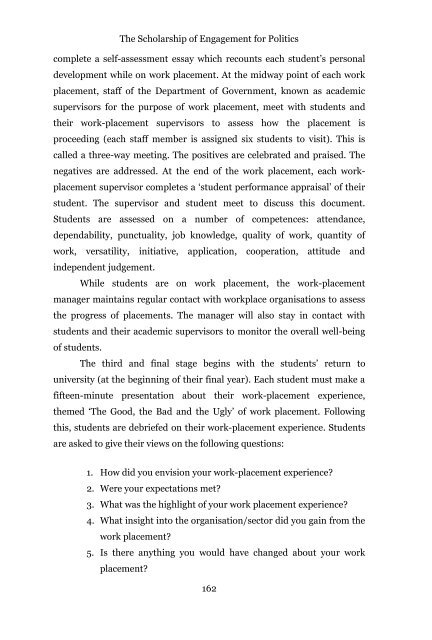The Scholarship of Engagement for Politics: - Higher Education ...
The Scholarship of Engagement for Politics: - Higher Education ...
The Scholarship of Engagement for Politics: - Higher Education ...
Create successful ePaper yourself
Turn your PDF publications into a flip-book with our unique Google optimized e-Paper software.
<strong>The</strong> <strong>Scholarship</strong> <strong>of</strong> <strong>Engagement</strong> <strong>for</strong> <strong>Politics</strong><br />
complete a self-assessment essay which recounts each student’s personal<br />
development while on work placement. At the midway point <strong>of</strong> each work<br />
placement, staff <strong>of</strong> the Department <strong>of</strong> Government, known as academic<br />
supervisors <strong>for</strong> the purpose <strong>of</strong> work placement, meet with students and<br />
their work-placement supervisors to assess how the placement is<br />
proceeding (each staff member is assigned six students to visit). This is<br />
called a three-way meeting. <strong>The</strong> positives are celebrated and praised. <strong>The</strong><br />
negatives are addressed. At the end <strong>of</strong> the work placement, each workplacement<br />
supervisor completes a ‘student per<strong>for</strong>mance appraisal’ <strong>of</strong> their<br />
student. <strong>The</strong> supervisor and student meet to discuss this document.<br />
Students are assessed on a number <strong>of</strong> competences: attendance,<br />
dependability, punctuality, job knowledge, quality <strong>of</strong> work, quantity <strong>of</strong><br />
work, versatility, initiative, application, cooperation, attitude and<br />
independent judgement.<br />
While students are on work placement, the work-placement<br />
manager maintains regular contact with workplace organisations to assess<br />
the progress <strong>of</strong> placements. <strong>The</strong> manager will also stay in contact with<br />
students and their academic supervisors to monitor the overall well-being<br />
<strong>of</strong> students.<br />
<strong>The</strong> third and final stage begins with the students’ return to<br />
university (at the beginning <strong>of</strong> their final year). Each student must make a<br />
fifteen-minute presentation about their work-placement experience,<br />
themed ‘<strong>The</strong> Good, the Bad and the Ugly’ <strong>of</strong> work placement. Following<br />
this, students are debriefed on their work-placement experience. Students<br />
are asked to give their views on the following questions:<br />
1. How did you envision your work-placement experience?<br />
2. Were your expectations met?<br />
3. What was the highlight <strong>of</strong> your work placement experience?<br />
4. What insight into the organisation/sector did you gain from the<br />
work placement?<br />
5. Is there anything you would have changed about your work<br />
placement?<br />
162
















